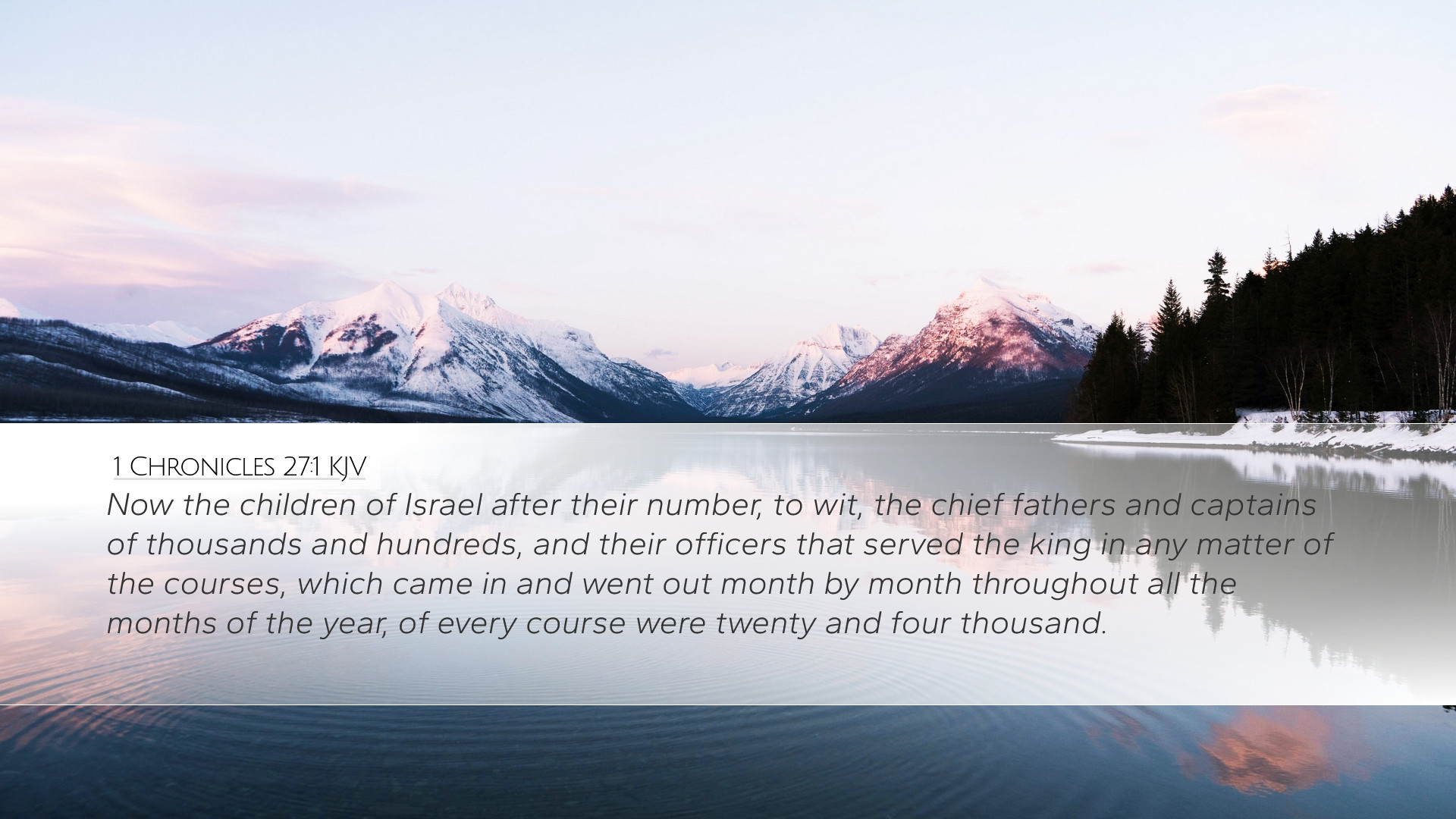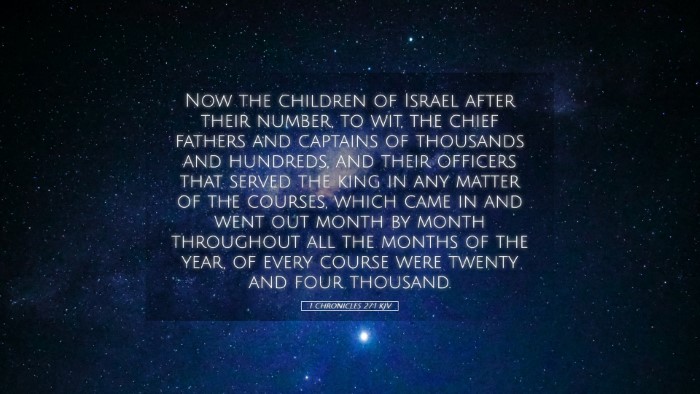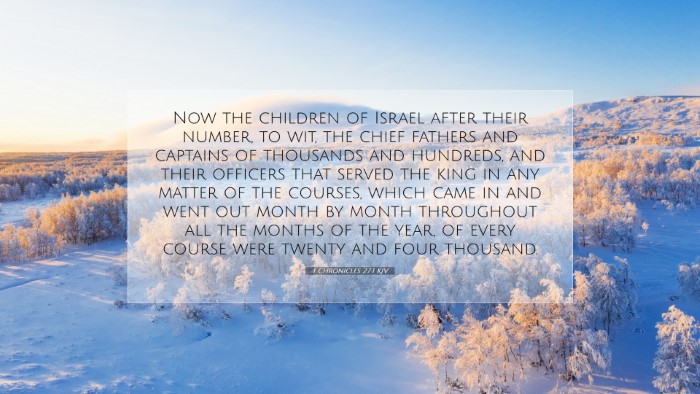1 Chronicles 27:1 - Commentary
Verse Reference: 1 Chronicles 27:1
"Now the children of Israel after their number, to wit, the chief fathers and captains of thousands and hundreds, and their officers that served the king in any matter of the courses, which came in and went out month by month throughout all the months of the year, of every course were twenty and four thousand."
Introduction
The passage from 1 Chronicles 27:1 forms part of the larger narrative establishing the organization and structure of King David's administration. This verse specifically highlights the system of serving the king, and the orderly structure established to manage the needs of the kingdom. Throughout the public domain commentaries, insights from noted theologians such as Matthew Henry, Albert Barnes, and Adam Clarke illuminate the significance of this organizational framework in the spiritual and practical life of Israel.
The Context of 1 Chronicles
The Chronicles are written to recount Israel's history with a focus on the Davidic kingdom and the temple's establishment. The chronicler's aim is not merely historical but also theological, intending to instruct the people on God’s sovereignty and the importance of worship. This chapter falls within the overview of military and civil organization under David's reign.
Commentary from Various Scholars
Matthew Henry's Commentary
Matthew Henry notes that this verse illustrates how David organized his kingdom and reinforces the idea of governance under divine order. He emphasizes the necessity of organization in leadership, particularly in matters relating to worship and the administration of the nation. Henry remarks, "God is a God of order; he takes notice of every single detail in the governance of his people. The arrangement of the people’s service reflects not just administrative savvy, but a respect for God’s divine order."
Furthermore, Henry observes that the numbering of the troops serves a dual purpose: it acknowledges the might of Israel's military and provides a basis for accountability of the leaders. This disciplined approach indicates a kingdom ready to respond to both external threats and internal governance.
Albert Barnes' Notes
Albert Barnes provides additional context by explaining that the children of Israel were counted as a way to ensure systematic military readiness and administrative order. He elaborates that each month, the rotations of soldiers amounted to a total of 24,000 men, which speaks to the scale of David’s power and the operation of his kingdom. Barnes highlights that this organization also reflects the significance of stewardship; leaders are accountable to their roles.
Barnes emphasizes, "The captains and officers serve not only as military leaders but also stand as representatives of the civil administration, pointing to the necessity of collaboration between spiritual and temporal authorities." This synergy is crucial in understanding how David's administration aimed to model a government that functions under the auspices of divine guidance.
Adam Clarke's Commentary
Adam Clarke takes a slightly different approach, focusing on the implications for national identity and structure. He highlights that the structure laid out in this verse emphasizes the communal aspect of governance. Clarke observes, "Each man counted represents not only his physical presence but also his household, thereby demonstrating the total strength of the nation as a collective entity." He also points to the spiritual responsibility that comes with leadership, suggesting that the king and his captains must also provide moral and spiritual guidance.
Clarke further notes the passage's importance in affirming that regular service and duty reflect a heart conducive to worship. The cyclical nature of their service serves as a reminder that worship and duty are inextricably linked in the life of the believer.
Theological Implications
The underlying theme of 1 Chronicles 27:1 is stewardship—both in the individual and corporate sense. God-centered governance requires leaders who are accountable and organized, reflecting God's orderliness. This verse offers rich insights into how earthly kingdoms ought to mirror divine principles.
- Order and Structure: The emphasis on structure allows the community to function efficiently under monarchy while maintaining important spiritual oversight.
- The Unity of Leadership: A critical aspect is the collective responsibility of leaders, which symbolizes unity and cooperation under God's rule.
- Preparation for Duty: The quarterly rotation signifies that the people were prepared and ready for their responsibilities at all times, which signifies both physical and spiritual readiness.
Practical Applications
For pastors, students, theologians, and scholars, 1 Chronicles 27:1 serves as a reminder of the importance of structure and governance in both church and community contexts. The application of orderly management in serving both God and community is paramount.
- Leadership Training: This text can encourage training programs that focus on equipping leaders with administrative skills and spiritual insights.
- Community Engagement: It emphasizes working together as a unified body, reminding church leaders of the importance of collaboration.
- Spiritual Readiness: Teaching about the readiness to serve in various capacities as an integral part of the Christian walk.
Conclusion
In summary, 1 Chronicles 27:1 is not just a verse about military organization but one that speaks of divine order, readiness, and collective responsibility. The commentaries by respected scholars illuminate its rich implications for understanding leadership within a biblical context. As we reflect on this verse, we are challenged to embody the principles of organization, accountability, and stewardship within our own spiritual communities and lives.


